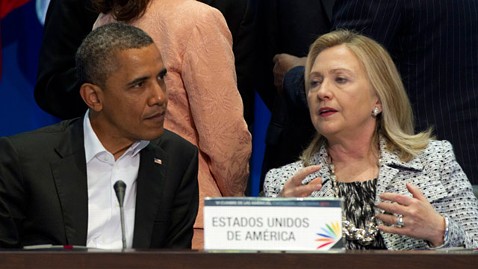Nov 26, 2012 6:45am

Carolyn Kaster/AP Photo
As President Obama prepares for his second term, preparations have begun for the traditional shuffling of the Cabinet.
Top priority for the president: filling slots for those top officials heading — if not running — for the door: Secretary of State Hillary Clinton and Secretary of the Treasury Tim Geithner.
To replace Clinton, Democratic insiders suggest that U.S. Ambassador to the United Nations Dr. Susan Rice is the frontrunner, with Sen. John Kerry, D-Mass., also a viable candidate.
Rice has been harshly criticized by Republicans for the erroneous comments she made on Sunday news talk shows after the attack on the U.S. compound in Benghazi, Libya, comments that were based on intelligence reports that falsely blamed the attack on a protest against an anti-Muslim video. When the president, during his recent press conference, offered a vociferous defense of Rice, many of those close to him began to suspect he was tipping his hand as to what he might decide.
To replace Geithner at Treasury, White House chief of staff Jack Lew is thought to have the inside track if he wants it, with other possibilities including Neal Wolin, the current deputy secretary of the Treasury and Lael Brainard, current under secretary of the Treasury for international affairs.
Other informed sources suggest that there is consideration being given to a business/CEO type such as investor Roger Altman, former Time/Warner chair Richard Parsons, and Facebook’s Sheryl Sandberg.
Those are the two most pressing jobs to fill, with Clinton exhausted from a long stretch in government — eight years as first lady, eight as senator, and four as secretary of state — and the president having personally promised Geithner’s wife that he could leave as soon as possible after the election.
Any of the business/CEO types being discussed for treasury secretary could also serve as secretary of commerce, a position that for the Obama administration has proved as troublesome as the role of drummer in Spinal Tap. Jeff Zients, the acting director of the Office of Management & Budget, is said to be under consideration.
It’s too flip to refer to it as a consolation prize, but informed sources say that — with Defense Secretary Leon Panetta also planning on leaving — Kerry could be offered the position secretary of defense if he wants it, though the Massachusetts senator has suggested he only wants State. Another option, Michelle Flournoy, a former under secretary of defense for Policy, would be the first female to serve in that position. There was some discussion of National Security Adviser Tom Donilon moving across the river, but it seems clear, sources say, that he’s staying where he is.
If Lew leaves to take the position at Treasury, some possible replacements for him as chief of staff include deputy National Security Adviser Denis McDonough or Vice President Biden’s former chief of staff Ron Klain. Tom Nides, deputy secretary of state for management and resources, has also been discussed.
President Obama’s senior adviser David Plouffe has also long discussed leaving the White House. There are many options to fill his shoes, including the elevation of communications director Dan Pfeiffer. Also possible: bringing back former press secretary Robert Gibbs, or former deputy chief of staff/campaign manager Jim Messina. Another option might be to bring in some of the people who were part of the messaging shop in the campaign — David Simus, who served as director of opinion research for the campaign, or Larry Grisolano, who did ads for campaign.
– Jake Tapper









